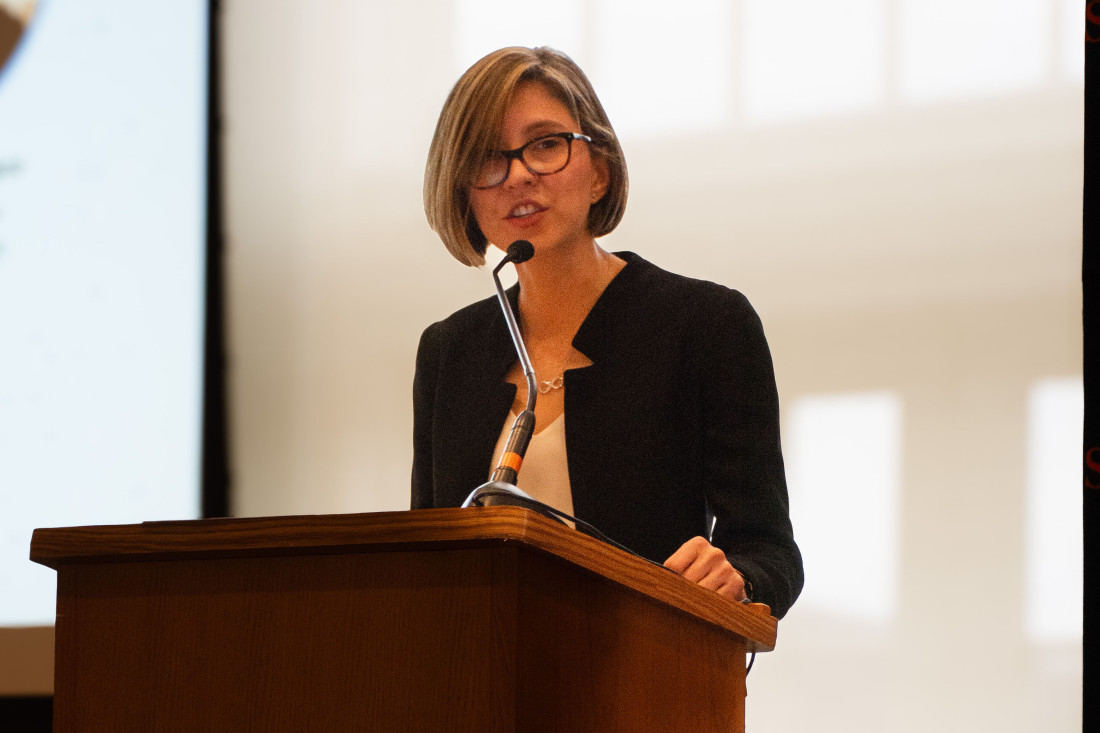Data Science Ph.D. Student Promotes AI Accountability at Youth Conference

Karolina Naranjo-Velasco has long believed in the power of technology to promote a more just society.
It is a belief that brought her from Colombia, where she was an attorney focused on defending the rights of victims of conflict, to the University of Virginia’s School of Data Science.
Now, as a doctoral student at the School, Naranjo-Velasco is studying how artificial intelligence can help make the legal system more accessible to the public while also arguing for accountability and safeguards for AI tools so that they are beneficial to society.
During a virtual seminar organized by Youth Talks this summer, she shared some of the insights she has gleaned from her research and career and why she is hopeful that, with proper human oversight and management, AI can be a tool for good.
“It’s not like the movies. Here, we are in charge,” Naranjo-Velasco told panelists in seeking to dispel fears about a coming reality reminiscent of the “Terminator” films where machines seize control.
Launched in 2022 by the Higher Education for Good Foundation, Youth Talks works to elevate youth voices, so that when policymakers and other organizations make decisions about the future, those choices reflect the concerns and priorities of young people.
At their summer panel focused on AI, the group took a closer look at the technology’s potential impact on young people across the globe, from its implications for the workforce to environmental sustainability.
During her remarks, Naranjo-Velasco sought to assure participants that they are not helpless bystanders amid AI’s continued development, saying that AI users and designers can be “agents of change.”
“Humans are the engineers who create those machines; humans are the users; humans are the stakeholders that receive the benefits and also the risks of those machines,” she said, adding that “everyone is the loop” when it comes to AI’s presence in society.
Ensuring AI accountability and promoting beneficial interactions between machines and humans will require a number of actions, Naranjo-Velasco explained, including regulations.
As rules are developed by governments, she urged everyone to get involved.
“As stakeholders, we need to advocate for ourselves,” Naranjo-Velasco said, arguing that this is critical to crafting regulations that effectively serve society.
She also emphasized the need for oversight, citing the case of an AI recruiting tool once used by Amazon that was shown to discriminate against female applicants; it was later discontinued.
Naranjo-Velasco said this incident illustrated why diversity in oversight of AI systems was critical.
“The idea is to capture all of the nuances of society,” she said.
So, how can young people help promote a culture of accountability with AI? As end users, part of it comes down to awareness, Naranjo-Velasco said.
“You should be aware about the machine behaviors in social media applications,” she said, noting that the extent to which social media users maintain control of pictures they share, for example, remains an open question. By heightening their awareness of how their data are being used, Naranjo-Velasco said, young people will be better positioned to propose solutions.
Throughout the panel, Naranjo-Velasco emphasized that everyone, whether designers of AI technology or users of it, should make their voices heard so that AI tools are held accountable to whether they are benefiting society.
If that happens, she said, the continued expansion of AI could provide immense value to humanity: “Technology can amplify the best of ourselves.”
Marine Hadengue, the executive director of Youth Talks and moderator of the panel, wrapped up the event by acknowledging the anxiety many young people feel about AI and what it might mean for their lives and ability to connect with each other. As society continues to debate this defining issue, she, like Naranjo-Velasco, emphasized the importance of keeping humans at the center of it all.
“We are human beings. The basics of our happiness are quality human relationships. So, we need to make sure that we keep that aspect in our lives and use technology for the right challenges,” Hadengue said.



